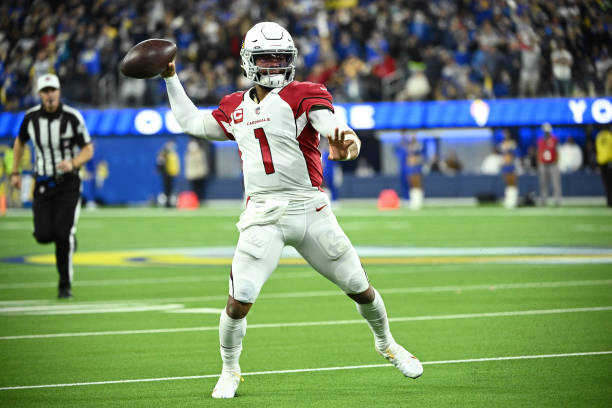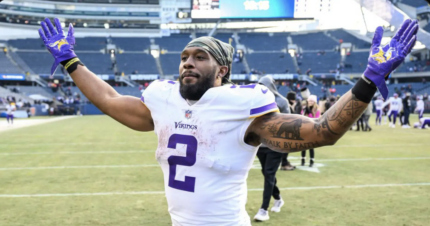Earlier this afternoon, the NFL Today pregame show on CBS ran special Thanksgiving Day feature on the late head coach of the Minnesota Vikings and Arizona Cardinals, Dennis Green. In July, the National Football League lost a beloved friend when Green passed away from cardiac arrest at the age of 67. From 1992-2001 Green led the Minnesota Vikings to the playoffs in eight of his 10 seasons at the helm. Some remember him for his fiery press conference while coaching Arizona, most think of him as a pioneer. But viewers learned that Dennis Green should be acknowledged for so much more — especially this time of the year.
In his honor, we’re rewinding J.R. Gamble’s Shadow League column that was published in July, as we paid homage to Green’s legacy.
***
When pioneers pass away, they take a piece of history with them. We lose something, but it’s hard to express exactly what it is. You just know that an integral part of something you truly love is gone.
Legendary NFL coach Dennis Green died suddenly on Thursday evening of a heart attack. The 67 year old was one of the first African-American head coaches in the NFL, and although he never won a Super Bowl, he helped revolutionize the game, proved his ability to lead men and execute with intelligence from his days as head coach at Stanford University to his glory years leading the Minnesota Vikings rebirth in the 1990’s.
For a guy whose father and mother died when he was 11 and 13 respectively, just being able to survive was an accomplishment. Green didnt stop at survival, he went on to become one of the best football coaches that ever lived.
After several years of gaining experience with different major colleges as an assistant, Green got his first head coaching job in 1981 at Northwestern University, a school that had lost 31 of its last 33 games. He helped shake Northwesterns losing culture and broke the conference’s coaching color barrier. Green was named the Big Ten Conference Coach of the Year in 1982.
Crushing stereotypes and busting through barriers like a fullback leading an old school, Power-I rushing play, was the basics for Green. He was an innovator, a players coach and only the second African-American head coach in Division I-A history.
In 1992, hed become the second African American head coach after Art Shell in the modern NFL era, and only the third of all-time (Fritz Pollard was the first). He immediately showed a profound coaching prowess and through his first six years as HC, Green never flexed a losing record and the Vikings missed the playoffs once. The NFL has seen a ton of coaches ride on its carousel since then and 90 percent haven’t experienced Green’s success.
“Denny made his mark in ways far beyond being an outstanding football coach,” the Vikings said in a statement. “He mentored countless players and served as a father figure for the men he coached. Denny founded the Vikings Community Tuesday Program, a critical initiative that is now implemented across the entire NFL. He took great pride in helping assistant coaches advance their careers. His tenure as one of the first African-American head coaches in both college and the NFL was also transformative.”
Green was a member of the prolific coaching corps constructed by 49ers head coach Bill Walsh in the 1980’s. It was a group that has produced a number of high-profile NFL coaches, game shapers and changers, including George Seifert and Mike Holmgren.

(Photo Credit: 49ers.com)
He also had a successful career as an NFL analyst, lending his keen insight, emotion and professional credibility.
In his 13 years as an NFL head coach, Green compiled a 113-94 record with the Minnesota Vikings and Arizona Cardinals. In 1998, he had his defining season as a coach, as his multi-talented Vikings squad went 15-1 in the regular season and broke the record for most points scored in one campaign.
Unfortunately they lost in the NFC Championship Game, but the standard of Vikings excellence was set and the franchise hasnt come close to matching the success of Greens tenure to this day.
The Harrisburg, Pa. native was a leader of men; a throwback who often wore his emotions on his sleeve, was no nonsense, but was also a comedian at times, who understood the value in being humble and laid back. He was a strategist as well as an inspiration to his players.
Oakland Raiders head coach Jack Del Rio played for Green on those legendary Vikings teams led by quarterback Randall Cunningham and wide receivers Cris Carter and Randy Moss. That aerially-gifted machine made the NFC Championship Game in both 1998 and 2000.
Dennis Green created an outstanding environment for his players and I was privileged to spend four great years under his guidance in Minnesota, said Del Rio, in a statement. He was a real trailblazer and his impact on the game continues to live through the many successful coaches that he mentored. One of his phrases, or Denny-isms as we call them, is Were going to plan our work and work our plan. I still use that Denny-ism today. Coach Green is going to be missed dearly by everyone that was lucky enough to know him.

(Photo Credit: dailynews.com)
C.C. joined Colin Cowherd Friday to discuss his late coach, and the impact he had on both football and Carter himself.
He started the three-receiver offense and I became the first big, slot receiver, said the prolific pass-snatcher. He also developed me as a man and challenged me as a leader and gave me a great deal of responsibility and no one took more second chances on human beings than Dennis Green…He was all about that.
Its Greens handling of men that distinguished him more than anything else. His understanding of the culture and the players and beyond money, fame and a starting position, what they really needed to flourish in life.
Carter says he was a true father figure.
If you look at a lot of the players who had success with him, they’re guys that didn’t have father figures. Myself and Randy Moss were the biggest examples of that, Carter told Cowherd.
I was able to talk to him, about the things I was going through as a man. I’d say definitely a father figure but also as an African-American, he really pushed the African-American players to fulfill their roles, not only as fathers, but in society. To have a voice, make your life mean something. He grew up in an era where Muhammad Ali, Wilt Chamberlain, all the greats at the time, Kareem (Abdul-Jabbar), Jim Brown, those are the guys that had an influence on him. So privately that influence was put on me.
The lasting impact Green has on the game as a winning minority coach is far-reaching. You can see some of Green in every African-American coach today. Mike Tomlin has his fire and controlled aggression. Lovie Smith has Greens silent confidence. Todd Bowles has his intellectual approach to the game and understanding of defenses.
Overall, Green has a coaching lineage as impressive as anyones. Super Bowl winning coaches Brian Billick, Baltimore Ravens (19992007) and Dungy, Tampa Bay Buccaneers (19962001), Indianapolis Colts (20022008), as well as Mike Tice, Minnesota Vikings (20012005) were all assistants under Green who became head coaches.
With the recent attention being paid to the NFLs lack of diversity in the hiring of head coaches, Greens illustrious career should be used as an example of what a Black coach can achieve when given the opportunity and a blueprint for any man longing to assume the fragile, overwhelming and burdensome job of NFL HC.
Green’s 1998 season was the most successful season ever recorded by an African-American coach in the NFL before Tony Dungy stole his thunder and a Super Bowl ring with Peyton Manning.
He tied his career with an immortal bow, the perfect coaches rant and an unforgettable representation of his passion for the game on Monday Night Football in a crucial contest against the Chicago Bears on October 16, 2006. After losing a 20-point lead to the Chicago Bears in less than twenty minutes, Green spit his most memorable 16 bars of fury at reporters and dropped the mic and passionately exited the pro game that season like the hurricane of football funk that he was.



